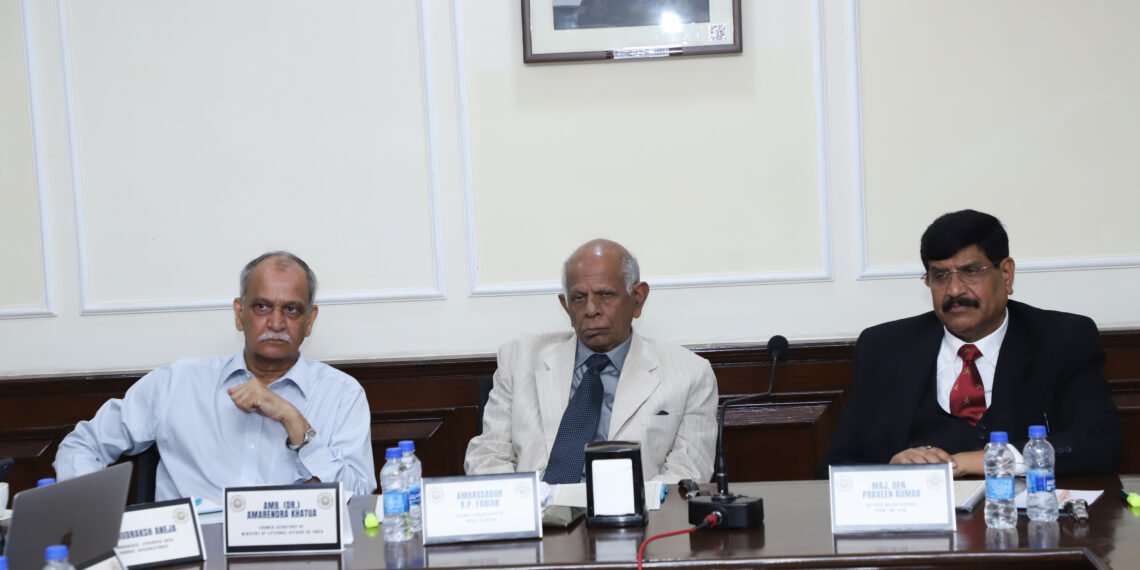CyberPax 2024 brought together some of the brightest minds from various fields for an intensive panel discussion on the pressing legal and geopolitical challenges posed by Artificial Intelligence (AI). Held at the prestigious Civil Services Officers’ Institute, the event aimed to explore critical issues such as hybrid warfare, cybercrime, and AI governance, underlining their far-reaching impacts on global security and international relations.

The high-profile panel was moderated by Ambassador K.P. Fabian, who set the stage for in-depth discussions on the transformative role of AI in the current geopolitical landscape. The event began with Retired Major General Praveen Kumar delivering an incisive overview of AI’s role in hybrid warfare. He emphasized the legal challenges arising from the deployment of AI in modern conflicts and called for more robust regulatory frameworks to address these emerging threats.
Also Read: Doctors protesting agree to meet following Mamata Banerjee’s ‘fifth and final’ invite

Following this, Retired Wing Commander Praful Bakshi took the audience through the rapidly evolving realm of cyberwarfare. His structured presentation detailed how AI is changing defense systems and highlighted the significant implications for national and global security. Bakshi stressed the importance of adapting defense strategies to effectively counter cyber threats.

One of the key speakers, IPS Nidhin Valsan, offered a unique perspective by focusing on the human side of AI-driven cybercrime. Drawing from his experience working with cybercrime victims, Valsan provided insights into the victim’s mindset and the psychological toll that such crimes inflict. His talk underscored the need for preventive policies that not only address the technical aspects of cybercrime but also offer support to its victims.
Advocate Jayesh Unnikrishnan contributed to the discussion by analyzing the current gaps in cyber law. He raised concerns about how these gaps affect human rights, particularly for marginalized communities, who are often the most vulnerable to the negative impacts of AI and cybercrime. Unnikrishnan’s speech called for more inclusive and equitable legal frameworks to protect vulnerable populations.

The panel also ventured into how AI intersects with broader societal issues. Prof. Dr. Bharti Chhiber discussed the crucial link between AI governance, multilateralism, and its impact on gender equality and climate change. Her talk emphasized the need for global cooperation in shaping AI policies that consider these critical issues. Prof. Dr. Rashmi Salpekar, Dean of the Vivekananda School of Law and Legislative Studies at VIPS-TC, added to the conversation by outlining the role academic institutions can play in crafting AI regulations, particularly in conflict zones. She stressed that academia must contribute more actively to the formulation of sound AI policies.
Privacy and national security concerns were also a focal point of the event. In a compelling speech delivered in Hindi, Mr. Manoj Gorkela addressed the balancing act between ensuring national security and protecting individual privacy in the era of AI. His talk resonated with many attendees, highlighting the urgency of developing AI regulations that do not infringe upon personal freedoms while safeguarding national interests.
Ambassador Amarendra Khatua provided the final remarks of the panel discussion, summarizing the critical points raised and urging policymakers and leaders to prioritize the issues discussed. His closing words served as a call to action for stronger AI governance frameworks on both national and international levels.

The event concluded with an engaging interactive Q&A session, where young organizers and participants posed insightful questions to the expert panelists. The founders of CyberPax, Mr. Rudraksh Aneja and Ms. Jahnavi Srivastava, wrapped up the event with closing notes that reiterated the importance of fostering dialogue on AI governance. They emphasized CyberPax’s mission to serve as a vital platform for raising awareness and driving action toward comprehensive AI policies.
CyberPax 2024 stands as a significant milestone in the ongoing global conversation on AI’s future, law, and governance. The event underscored the urgent need for collaborative efforts to address the legal, ethical, and geopolitical challenges posed by AI technologies and their profound implications for global security.














